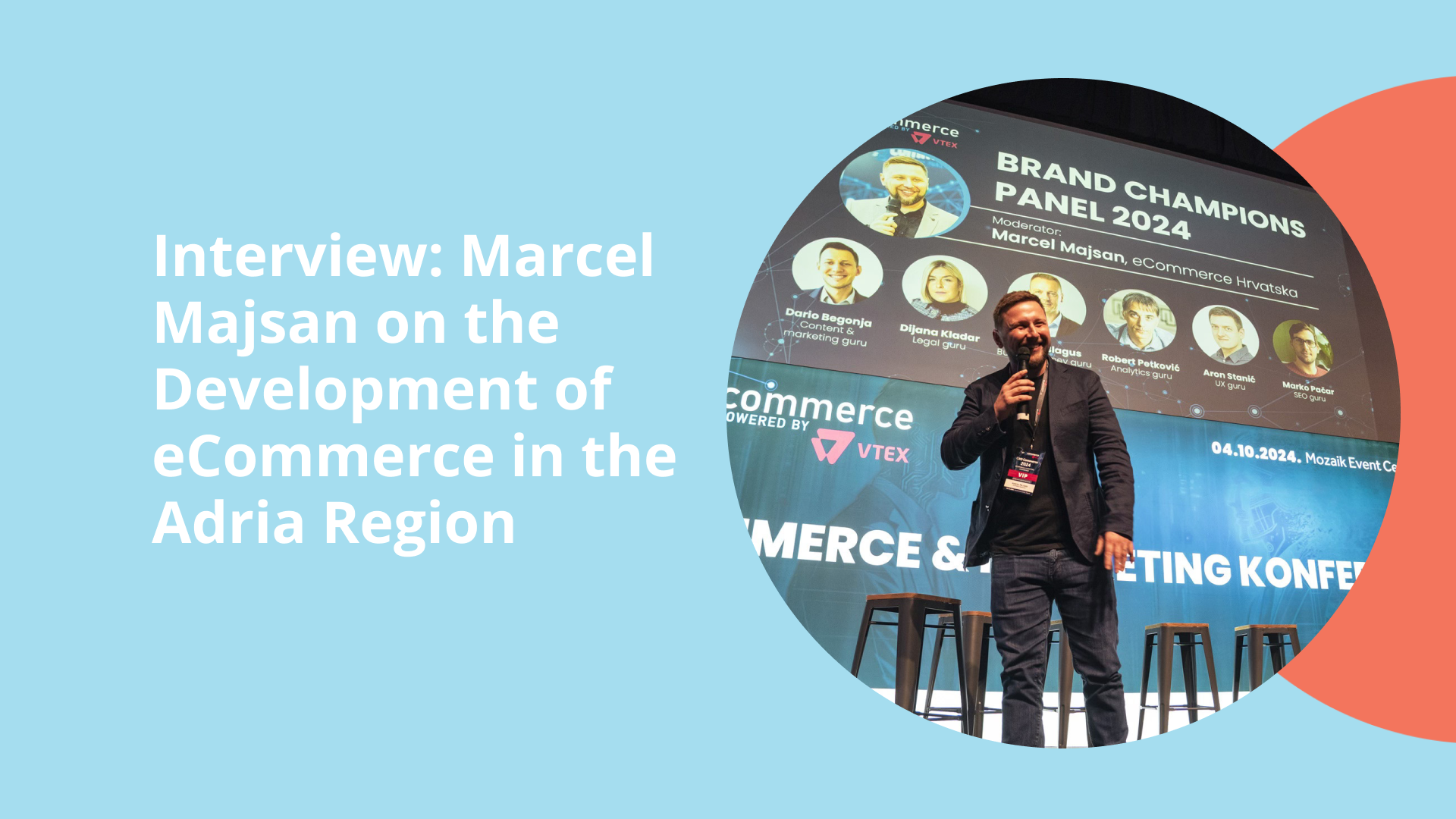The Adria region is becoming increasingly important for our company, CJ VIVnetworks. Through our CJ.com platform, we are actively developing affiliate programs in Adria for clients such as Notino, BigBang, Megabon, Booking, Esky, Answear, Aboutyou, Footshop, Libristo, Lisca, Lelosi, Mohito, Zepter, Crocs, Sensilab, and many others.
We strive to inspire local eCommerce players by showcasing affiliate success stories from more developed markets in Central and Western Europe, helping them grow their affiliate programs in Adria and beyond. At the same time, we absorb insights about the Adria eCommerce market and share them to encourage international brands to expand their business into the region.
As part of our expansion efforts, CJ VIVnetworks closely collaborates with local eCommerce associations in the Adria region, with the most prominent being the Croatian eCommerce Association.
A valuable partner and excellent spokesperson on eCommerce development in Adria is Marcel Majsan, President of the Croatian eCommerce Association. In response to our questions, he presented the market and its growth potential. Marina Kostkova, Business Development Manager at CJ VIVnetworks, added her perspective on the region’s development from the affiliate network standpoint.
Question: How is the Adria market developing?
Marcel Majsan:
Back in 2015, when I founded the Croatian eCommerce Association, a law came into effect that significantly influenced online shopping (aside from the pandemic and lockdowns). This law allowed customers to return goods purchased online within 14 days without providing a reason. Initially, many merchants hid this information in their terms and conditions, unaware that highlighting it on the homepage could actually build trust and boost sales. One of our first campaigns 10 years ago was to inform merchants about this law. Unfortunately, the law only applies to EU countries, so it doesn’t cover neighboring countries like Bosnia and Serbia. Still, I believe it shaped merchants’ understanding of the importance of earning customer trust.
The pandemic was an even greater catalyst. It encouraged people who had never shopped online to try it, and pushed merchants to improve their webshops or create their first ones.
The entry of major European brands brought free shipping and returns, raising standards in local markets.
Today, platforms like Temu and Shein are trending due to their vast product range, competitive prices, ease of use, personalization, quality customer support, and fast, reliable delivery. These elements create a powerful ecosystem that attracts and retains users, making these platforms leaders in global and regional eCommerce.
I haven’t personally worked on projects in the region, but after us, eCommerce associations were launched in Serbia, Bosnia, and recently Montenegro. Everyone seems to be watching what Croatia does, knowing their customers will soon expect the same. Just as Croatians look to the West and the U.S.

Question: Where do you see the biggest growth opportunities?
Marcel Majsan:
The key to further growth in eCommerce isn’t some magical strategy. It’s merchants being willing to expand internationally, seriously start cross-border sales, and finally compete in the European market. For that, faster, cheaper, and more reliable international shipping is essential. It’s not as expensive as merchants think, especially within the EU.
Next, customer support standards need to improve—buyers want instant solutions and support across all channels. Practical education is also needed, with hands-on workshops and experience sharing for webshops.
In short: international expansion, faster and cheaper global shipping, better customer support, practical education, and less bureaucracy. That’s the recipe for serious growth. Everything else is just an excuse.
Question: What challenges do merchants most often face?
Marcel Majsan:
Most local web merchants have only a basic understanding of laws, especially GDPR. Large companies have teams and external experts. Small players often copy terms from bigger ones until a problem arises. Laws change frequently, and small merchants struggle to keep up.
Fortunately, lawyer Dijana Kladar, who specializes in commercial and eCommerce law, is our association’s vice president. You can enroll in her module at our Academy or hire her as needed.
As for user experience and websites, Croatian web merchants can be surprisingly good. Confirmed by results from our eCommAwards competition, where we’ve analyzed over 500 webshops. We have individuals and companies that match or even surpass European competitors in UX and digital marketing. However, most still struggle with resources and the eternal question: “How to stay within budget while delivering a top-notch experience?”

Question: How do you compare the markets in Croatia, Slovenia, Bosnia, and Serbia?
Marcel Majsan:
Croatia has the largest market in terms of eCommerce revenue, with most major players being domestic retail brands with multiple stores nationwide (home/electronics/groceries).
Slovenia is a smaller but more mature market (high card usage, strong local platform), and their consumers increasingly shop cross-border within the EU.
Bosnian shops closely follow the western part of the region in terms of website quality and card payment popularity. Their classified platform OLX.ba is extremely popular, similar to Njuškalo in Croatia, but with the added ability to order directly through listings—making them somewhat more advanced than Croatians in that regard.
Serbia is growing rapidly in terms of traffic, with marketplaces like Ananas and Shoppster setting new standards. Cash on delivery (COD) is still dominant across all markets—indicating a lack of trust and the need to change consumer habits to reduce it.
Question: How can merchants increase customer trust and security?
Marcel Majsan:
- First and foremost: regularly follow legal updates, which they can do for free via the Croatian eCommerce Association newsletter and our publicly available eCommerce Magazine (www.ecommerce.hr)
- Use strong passwords on their webshops (the damage from a hack can be immense in terms of lost trust)
- Regularly update all plugins/modules on their webshop platforms
- Provide clear and accessible information on return policies, data protection, and customer support contacts (and ensure those contacts actually respond)
- Display a trust badge (signals to customers that the webshop is verified by a third party)
- Use a reputable review system (Google, Trustpilot, or our Safe Shop)
Question: How can associations help?
Marcel Majsan:
Many merchants lack awareness of the importance of trust, so they invest too little in improving user experience, customer support, and using reviews as tools to increase transparency and enhance service quality. The eCommerce Croatia Association offers all its members free certification and the Safe Shop tool for collecting and displaying reviews, which we developed ourselves. This provides local and fast support in case of fake reviews or if merchants want to upgrade the system. We hope that other associations in the region will start using the Safe Shop tool soon, as it would significantly boost trust and, consequently, service quality across the region.


Question: What is the state of affiliate development in Adria?
Marina Kostkova:
The Adria region is a younger affiliate market compared to the highly developed U.S., Western, and Central Europe. Even within Adria, there are noticeable differences in affiliate development between Serbia, Bosnia and Herzegovina, Albania, Montenegro, and North Macedonia, compared to Croatia and Slovenia, which are part of the EU and have more advanced affiliate ecosystems and greater expansion of international eShops—resulting in higher competition.
We still occasionally encounter situations where people don’t know what affiliate marketing is or are afraid of it. We encourage them to try it because there’s nothing to lose. Registration on our CJ.com affiliate platform is completely free for publishers, and eShops only pay a commission if a sale occurs.
We’re happy to report that there are already over 100 live affiliate programs in the Adria region on the CJ platform, with a larger share in Croatia and Slovenia compared to other countries.
Question: How do platforms like Temu and Shein impact affiliate marketing?
Marina Kostkova:
Platforms like Temu and Shein increase costs in local markets, prompting eShops to seek more cost-effective advertising tools. Naturally, as competition grows, more webshops turn to performance marketing, including affiliate marketing, because they only pay commissions for completed orders.
Many clients are currently shifting their budgets from PPC and META to affiliate. To remain competitive, eShops must improve customer service—where platforms like Temu and Shein excel—and expand internationally. With affiliate marketing, this is simple: the webshop just needs a translated website and organized delivery for the target market. Our CJ platform publishers can handle the rest.
Many CJ publishers operate across multiple markets. So once they join a webshop’s affiliate program, they’re likely to promote the brand in other countries too. Adria eCommerce players currently see great opportunities for international expansion. Slovenia is particularly active—not only in traditional eCommerce but also in other verticals like services, tourism, insurance, telecom, etc.

Question: Data-driven decision-making is becoming increasingly important in marketing. How does CJ VIVnetworks help clients analyze campaign results and optimize performance?
Marina Kostkova:
It’s crucial for eShops to analyze what they need to do to be attractive both to end users and affiliate publishers—whose promotion leads to sales. Managers must strategically plan sales campaigns based on seasonality and define publisher commissions in advance.
Now, even in Adria, eShops want to see exact ROI—they don’t want to spend their entire budget on clicks. Our CJ.com platform, developed over many years, offers a 100% transparent reporting system. eShops can access live data, analyze campaign performance in full, or compare results from selected publishers and see cost shares.
Due to increasing competition, eShops have less budget to hire additional staff for developing new sales channels. That’s why, for the past 15 years, we’ve been providing local affiliate managers to help eShops develop and analyze affiliate results and make using the affiliate channel easier.

Question: Where can we meet CJ VIVnetworks in the Adria region?
Marina Kostkova:
Our team of around 50 representatives is spread across all Adria countries and Europe. In addition to organizing our own free online and offline conferences, we also participate in panel discussions and present at numerous eCommerce events. Through collaboration with local eCommerce associations, we aim to spread knowledge and successful affiliate marketing practices.
One of the biggest upcoming eCommerce events in Adria is the CRO Commerce Conference in Zagreb on October 14, 2025, organized by the eCommerce Croatia Association. Our Adria team will be present at a large booth, and we warmly invite you to meet us there. On stage, we’ll present an exciting topic: “Marketing Olympics: Winning with Profitable Affiliate Decathlons.” From experience, I can say that developing an eShop and affiliate sales channel is a never-ending process. We’re always in a cycle: launch a campaign, analyze results, optimize, and repeat. But eShops that are willing to test new partnerships and take steps toward business expansion consistently achieve better long-term results.




